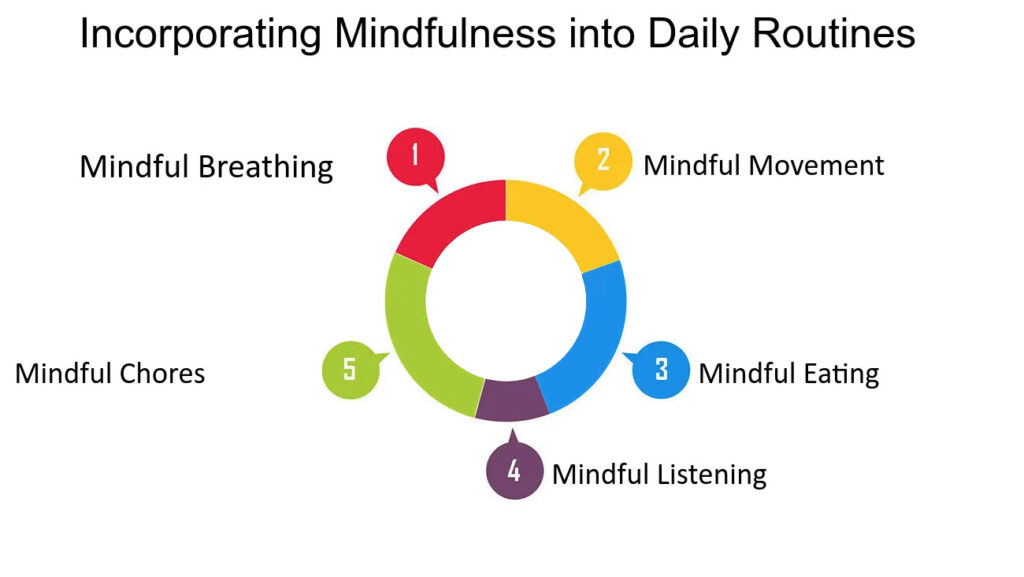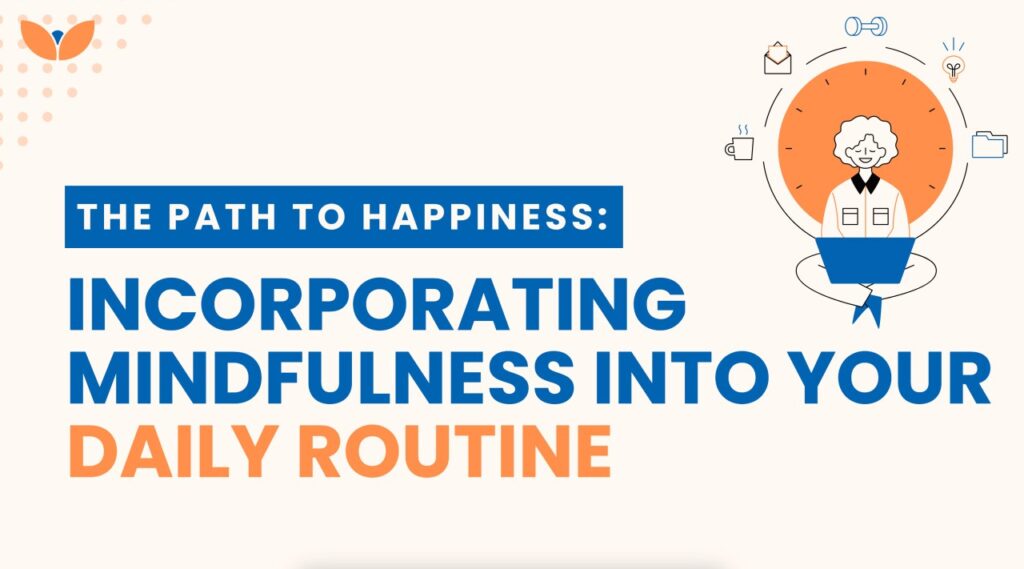In the fast-paced, technology-driven world we inhabit, it’s easy to get caught up in a whirlwind of thoughts, worries, and distractions. Our minds flit from task to task, rarely settling in the present moment. This constant mental chatter can lead to stress, anxiety, and a general feeling of being disconnected from ourselves and the world around us. Fortunately, there’s a powerful antidote to this modern malady: mindfulness.
Mindfulness, at its core, is the practice of paying attention to the present moment without judgment. It’s about observing our thoughts, feelings, and sensations as they arise and pass, without getting swept away by them. It’s about cultivating awareness of our surroundings and appreciating the simple joys of everyday life. Integrating mindfulness into your daily routine can have a profound impact on your overall well-being, reducing stress, improving focus, and fostering a deeper sense of connection and appreciation.
This guide aims to provide a comprehensive roadmap for incorporating mindfulness into your daily life. We’ll explore the benefits of mindfulness, delve into various practices, and offer practical tips for weaving mindfulness into different aspects of your day, from waking up to winding down.

Understanding the Benefits of Mindfulness
Before embarking on your mindfulness journey, it’s essential to understand the myriad benefits it offers. Mindfulness is not just a fleeting trend; it’s a scientifically-backed practice with tangible positive effects on both mental and physical health.
- Reduced Stress and Anxiety: Mindfulness helps regulate the nervous system, calming the body’s “fight or flight” response. By paying attention to the present moment, we can break free from rumination on past events or worries about the future, reducing overall stress levels.
- Improved Focus and Concentration: Regular mindfulness practice strengthens the brain’s ability to focus attention. By training ourselves to gently redirect our attention back to the present moment when our minds wander, we cultivate greater mental clarity and concentration.
- Enhanced Emotional Regulation: Mindfulness helps us become more aware of our emotions and develop a healthier relationship with them. Instead of suppressing or reacting impulsively to our feelings, we can learn to observe them with equanimity, allowing them to pass without overwhelming us.
- Increased Self-Awareness: Through mindfulness, we gain a deeper understanding of our thoughts, feelings, and behaviors. This self-awareness allows us to identify patterns and triggers, making it easier to make conscious choices that align with our values and goals.
- Improved Physical Health: Studies have shown that mindfulness can lower blood pressure, improve sleep quality, and even boost the immune system. By reducing stress and promoting relaxation, mindfulness can have a positive impact on our overall physical health.
- Greater Compassion and Empathy: Mindfulness cultivates a sense of openness and acceptance, not only towards ourselves but also towards others. This fosters greater compassion and empathy, leading to more meaningful and fulfilling relationships.
- Enhanced Creativity and Problem-Solving: By quieting the mental chatter and fostering a state of open awareness, mindfulness can unlock creativity and improve problem-solving abilities. When we’re not caught up in our thoughts, we’re more likely to see new perspectives and solutions.

Mindfulness Practices to Incorporate
There are numerous mindfulness practices you can incorporate into your daily life. Experiment with different techniques to find what resonates with you and fits into your schedule.
- Mindful Breathing: This is a foundational mindfulness practice that can be done anytime, anywhere. Simply focus your attention on the sensation of your breath as it enters and leaves your body. Notice the rise and fall of your chest or abdomen, the coolness of the air entering your nostrils, and the warmth of the air leaving. When your mind wanders, gently redirect your attention back to your breath. Start with just a few minutes each day and gradually increase the duration as you become more comfortable.
- Body Scan Meditation: This practice involves systematically paying attention to different parts of your body, noticing any sensations without judgment. Start by lying down or sitting comfortably and bringing your awareness to your toes. Notice any sensations you feel – tingling, warmth, pressure, or nothing at all. Gradually move your attention up your body, focusing on each body part in turn. This practice helps you become more aware of your physical sensations and can be particularly helpful for relieving tension and promoting relaxation.
- Mindful Walking: Turn your daily walk into a mindful experience by paying attention to the sensations of your feet making contact with the ground, the movement of your body, and the sights and sounds around you. Walk at a comfortable pace and allow your mind to be fully present with the experience of walking.
- Mindful Eating: Most of us eat on autopilot, often distracted by our phones or televisions. Mindful eating involves paying attention to the taste, texture, and smell of your food, as well as the sensations of hunger and fullness. Eat slowly and savor each bite, noticing the different flavors and textures. Put down your fork between bites and take a few deep breaths. This practice can help you develop a healthier relationship with food and improve your digestion.
- Mindful Listening: When engaging in conversations, practice truly listening to the other person without interrupting or formulating your response. Pay attention to their words, tone of voice, and body language. This practice can improve your communication skills and deepen your relationships.
- Mindful Observation: Take a few moments each day to simply observe your surroundings without judgment. Notice the colors, shapes, and textures of the objects around you. Listen to the sounds, both near and far. Engage all of your senses and appreciate the beauty of the present moment.
- Gratitude Practice: Cultivating gratitude is a powerful way to boost your happiness and well-being. Each day, take a few minutes to reflect on the things you’re grateful for, both big and small. Write them down in a journal or simply reflect on them in your mind.
- Loving-Kindness Meditation: This practice involves directing feelings of love, compassion, and kindness towards yourself and others. Start by focusing on yourself, then gradually expand your focus to include loved ones, acquaintances, neutral people, difficult people, and finally all beings.

Integrating Mindfulness into Your Daily Routine: A Practical Guide
The key to successfully incorporating mindfulness into your daily life is to start small and be consistent. Choose one or two practices that appeal to you and gradually integrate them into your routine.
- Morning Mindfulness:
- Mindful Wake-Up: Instead of reaching for your phone first thing in the morning, take a few moments to lie in bed and gently awaken your senses. Notice the feeling of the sheets against your skin, the sounds of the morning, and the light filtering through your window.
- Mindful Breathing: Before getting out of bed, take a few deep breaths and focus on the sensation of your breath.
- Mindful Coffee or Tea: Prepare your morning beverage with intention, paying attention to the aroma, the warmth, and the taste.
- Morning Meditation: Even a few minutes of meditation in the morning can set a positive tone for the day.
- Mindfulness at Work:
- Mindful Commute: Instead of rushing through your commute, use it as an opportunity to practice mindfulness. Pay attention to the sights and sounds around you, or listen to a guided meditation.
- Mindful Breaks: Take short breaks throughout the day to step away from your work and practice mindful breathing or body scan meditation.
- Mindful Meetings: During meetings, practice active listening and pay attention to your own thoughts and feelings without judgment.
- Mindful Emailing: Before responding to an email, take a moment to pause and consider your words. Avoid reacting impulsively and strive to communicate with clarity and kindness.
- Mindfulness During Meals:
- Mindful Meal Preparation: As you prepare your meals, pay attention to the colors, textures, and smells of the ingredients.
- Mindful Eating: Eat slowly and savor each bite, noticing the different flavors and textures. Put down your fork between bites and take a few deep breaths.
- Mindfulness in Relationships:
- Mindful Communication: When interacting with others, practice active listening and speak with kindness and compassion.
- Mindful Quality Time: Dedicate time to spend with loved ones without distractions. Put away your phones and focus on being present in the moment.
- Mindfulness Before Bed:
- Mindful Evening Routine: Create a relaxing evening routine that includes activities like taking a warm bath, reading a book, or practicing gentle stretching.
- Mindful Breathing or Body Scan: Practice mindful breathing or body scan meditation before bed to help you relax and fall asleep.
- Gratitude Reflection: Reflect on the things you’re grateful for before drifting off to sleep.

Overcoming Challenges and Maintaining Consistency
Incorporating mindfulness into your daily life can be challenging, especially in the beginning. Here are some tips for overcoming common obstacles and maintaining consistency:
- Start Small: Don’t try to do too much too soon. Start with just a few minutes of mindfulness each day and gradually increase the duration as you become more comfortable.
- Be Patient: Mindfulness is a skill that takes time and practice to develop. Be patient with yourself and don’t get discouraged if your mind wanders.
- Find a Quiet Space: Choose a quiet space where you can practice mindfulness without distractions.
- Use Reminders: Set reminders on your phone or calendar to prompt you to practice mindfulness throughout the day.
- Join a Mindfulness Community: Connecting with other mindfulness practitioners can provide support and motivation.
- Be Kind to Yourself: Don’t judge yourself for your thoughts or feelings. Simply observe them with curiosity and acceptance.
- Don’t Give Up: There will be days when you struggle to practice mindfulness. Don’t let these days discourage you. Simply pick up where you left off the next day.
- Adapt to Your Needs: Find mindfulness practices that fit your lifestyle and adapt them to your individual needs.

Conclusion: A Journey of Self-Discovery
Incorporating mindfulness into your daily life is a journey of self-discovery, not a destination. It’s about cultivating a deeper awareness of the present moment and learning to accept ourselves and the world around us with greater compassion and equanimity. By embracing mindfulness, you can reduce stress, improve focus, enhance emotional regulation, and cultivate a greater sense of well-being. So, take a deep breath, embrace the present moment, and begin your mindfulness journey today. The rewards are immeasurable.